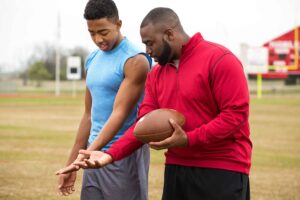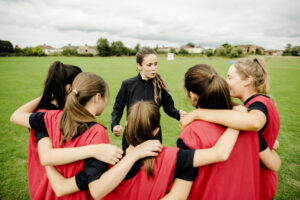When talented athletes come together to represent a nation, some must inevitably accept different roles than they have on their respective league teams. This was the case when Steve Yzerman, the architect of Canada’s 2014 Men’s Olympic Ice Hockey roster, based role assignments of selected athletes on positional need, player style and teamwork, rather than on reputations and previous accolades. Despite assembling a team of all-stars, the members’ egos were cast aside, culminating in Canada winning 3‑to‑0 over Sweden and claiming a second consecutive gold medal in men’s ice hockey.
Team sport represents an avenue whereby a collection of individuals unites to achieve a shared goal or purpose. However, to be effective in their collective pursuit of a goal, every team member must take on a smaller, more specific role (InnerDrive, 2019). The concept of a “role” within the complex topic of team dynamics is defined as a “set of behaviours that are repetitive activities, characteristic of a person in a particular setting” (Stewart et al., 2005). Essentially, a role outlines the specific behaviours that are expected of an individual to achieve established team goals (Martin, 2021).
Just like a puzzle, each of these individualized roles should interact seamlessly to help a team reach its untapped potential. Members will perform better individually when they understand their role on a team, and by extension, such clarity is necessary for team success.
This blog highlights the benefits of roles, emphasizes the importance of understanding a role, and provides practical implications for coaches when striving to establish and communicate role expectations.
The benefits of knowing your role:
Role affect refers to an athlete’s satisfaction with the significance of their role on their team (Eys et al., 2020). By clarifying a role, the athlete gains a deeper understanding of how their efforts contribute to team success. When an athlete knows their efforts matter to the group’s success, the athlete’s role becomes more personally meaningful (Foster, 2017). This motivational factor is powerful.
- Increased confidence
Role efficacy refers to the athlete’s belief that they can live up to the expectations of their role (Martin, 2021). Eys and Carron (2001) found that for elite university basketball athletes, their scope of responsibilities was predictive of task self-efficacy for defensive role responsibilities. This tells us that when athletes understand what’s expected of them, they’re more likely to believe in their ability to execute the required tasks.
- Honour the commitment, cherish the results
Role commitment is self-explanatory. It describes an athlete’s dedication to their role (Martin, 2021). Eys and Carron (2001) found that a decrease in role ambiguity led to increases in role commitment. When athletes understand their roles, they can buy into them, take responsibility for their development, and compete at the level required to accomplish team goals (Foster, 2017).
Everyone has a job to do
 Each member of a team will most likely occupy a role, and these roles can vary from being classified as formal or informal. Essentially, formal roles are those imposed by a role “sender” like a coach, where a set of expectations are communicated to the role occupant. Other examples of formal roles in sport are found in leadership, such as team captain or position-based assignments (three-point shooter, point-guard). Conversely, informal roles arise naturally as a by-product of interactions and observations from team members. These are typically linked to the personality and characteristics of the athlete (Martin, 2021). Some examples of informal roles are energy players and team comedians. It’s important for athletes to understand that both formal and informal roles are critical to how a team functions.
Each member of a team will most likely occupy a role, and these roles can vary from being classified as formal or informal. Essentially, formal roles are those imposed by a role “sender” like a coach, where a set of expectations are communicated to the role occupant. Other examples of formal roles in sport are found in leadership, such as team captain or position-based assignments (three-point shooter, point-guard). Conversely, informal roles arise naturally as a by-product of interactions and observations from team members. These are typically linked to the personality and characteristics of the athlete (Martin, 2021). Some examples of informal roles are energy players and team comedians. It’s important for athletes to understand that both formal and informal roles are critical to how a team functions.
Considerations for coaches
Research on role clarity highlights 4 characteristics that can identify the degree to which athletes understand their roles (Beauchamp et al., 2002). To help them understand, ensure that athletes:
- have been told the scope of their responsibilities
- know the necessary behaviours to fulfil their role
- know how coaches or front office staff will evaluate role performance
- are aware of the associated consequences of failing to fulfil the role’s responsibilities
 It’s important to know that a team’s success depends on how well each athlete understands and performs their role. Coaches must understand that, to create a sustainable winning culture, they must give each team member, ranging from starters to bench players, a set of behaviours that can become personally meaningful (InnerDrive, 2019). For that to happen, each player must understand the contribution of their role and how it significantly affects the group’s success (Foster, 2017). Clarity is the first step to accepting a role. It’s critical for buying into any role.
It’s important to know that a team’s success depends on how well each athlete understands and performs their role. Coaches must understand that, to create a sustainable winning culture, they must give each team member, ranging from starters to bench players, a set of behaviours that can become personally meaningful (InnerDrive, 2019). For that to happen, each player must understand the contribution of their role and how it significantly affects the group’s success (Foster, 2017). Clarity is the first step to accepting a role. It’s critical for buying into any role.
Coaches should take action to mobilize these conversations with players. Ask them about their perceptions of their role, and then discuss and come to an agreement about role expectations. Coaches must acknowledge that they appreciate their athlete’s efforts and give them the keys to excel in their role.
Conclusion
Roles represent an area where the common saying “knowledge is power” holds true. All athletes can benefit from enhanced role understanding, and coaches play a critical role in ensuring that each athlete understands their coach’s expectations.
